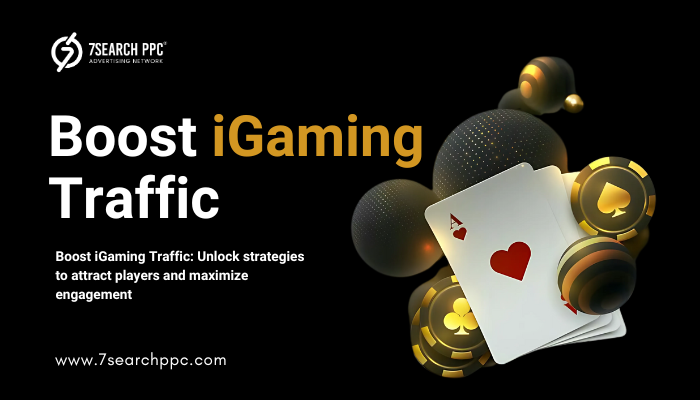Gaming companies use gambling advertisements as a promotional strategy to draw gamers to their platforms. Search engines, social media, radio, television, and native ad platforms are just a few of the places where these advertisements may be found.
To draw in new players, they emphasise elements like competitive odds, thrilling action, and extra incentives. By 2025, gambling ads have changed dramatically, using new technology and adjusting to more stringent legal requirements.

The Role of Gambling Advertisements in iGaming
The primary objective of gambling advertisements is to drive user engagement, build brand awareness, and increase traffic to online advertising, sportsbooks, poker rooms, and other gambling sites.
With the iGaming ad industry becoming more competitive, advertising has become an indispensable tool for businesses aiming to stand out. Modern strategies focus on personalization, leveraging data analytics to deliver tailored ads that resonate with specific demographics.
Key Channels for Gambling Advertisements
Social Media Platforms
Social media channels like Facebook, Instagram, and TikTok are vital for gambling advertisements. These platforms offer robust targeting igaming business, allowing advertisers to reach users based on their interests, behaviors, and location. Engaging formats such as short videos and interactive stories enhance the effectiveness of these campaigns.
Search Engine Marketing (SEM)
Search engine marketing remains a cornerstone of gambling advertisements. Operators use paid ads on Google and Bing to appear at the top of search results for keywords like "best online casino" or "top sports betting sites." This ensures high visibility among users actively seeking gambling services.
Native Advertising
Native ads blend seamlessly with the content users are consuming, providing a non-intrusive way to promote gambling platforms. They are particularly effective on news and entertainment websites, where users are more likely to click on engaging content.
Affiliate Marketing
Affiliate partnerships are another crucial channel for gambling advertisements. Affiliates drive traffic to gambling sites through blogs, reviews, and comparison websites, earning a commission for every referred player who signs up.
Emerging Trends in Gambling Advertisements in 2025
AI-Powered Personalization
Artificial intelligence is revolutionizing gambling advertisements by enabling hyper-personalized campaigns. AI analyzes user data to predict preferences and deliver highly relevant ads, increasing conversion rates.
Gamification in Advertising
Gamified ads are becoming popular, offering interactive and immersive experiences. These ads engage users by allowing them to try mini-games or challenges before signing up, creating a memorable impression.
Focus on Responsible Advertising
With growing scrutiny from regulators, operators are prioritizing gambling advertising. This includes clear disclaimers about the risks of gambling, promoting self-exclusion tools, and targeting only age-appropriate audiences.
Regulations Shaping Gambling Advertisements
Global Regulatory Landscape
The regulatory environment for gambling advertisements varies across regions. In 2025, stricter laws are being enforced globally to protect vulnerable populations. For instance, the European Union mandates clear labeling of gambling ads and prohibits targeting minors.
Compliance Challenges
Operators face challenges in maintaining compliance, especially when advertising across multiple jurisdictions. This necessitates robust compliance teams and tools to ensure adherence to local laws.
The Impact of Technology on Gambling Advertisements
Programmatic Advertising
Programmatic advertising automates the buying and placement of ads, ensuring they reach the right audience at the right time. This technology is widely used in gambling advertisements to optimize campaign performance.
Augmented and Virtual Reality (AR/VR)
AR and VR are transforming how gambling ads engage users. For instance, VR ads can offer a virtual tour of an online casino, while AR can create interactive ad experiences that captivate audiences.
Challenges Facing Gambling Advertisements
Ad Fatigue
Users are exposed to numerous gambling advertisements daily, leading to ad fatigue. To combat this, operators must focus on delivering high-quality, creative, and engaging content.
Ad Blockers
The rise of ad-blocking software poses a challenge to gambling advertisements. To counteract this, advertisers are investing in native ads and influencer marketing, which are less likely to be blocked.
Conclusion
Gambling advertisements are a vital part of the iGaming traffic, driving growth and innovation. In 2025, these ads are leveraging advanced technologies like AI, AR, and programmatic advertising while adhering to stricter regulations. By focusing on personalization, responsible practices, and immersive experiences, operators can create impactful campaigns that resonate with their audience.
Frequently Asked Questions(FAQs)
What are gambling advertisements?
Ans: Gambling advertisements are promotional strategies used by gaming operators to attract players through various channels like social media, search engines, and affiliate marketing.
How has technology impacted gambling advertisements in 2025?
Ans: Technology has introduced innovations like AI for personalization, programmatic advertising for optimized campaigns, and AR/VR for immersive ad experiences.
What are the main regulations for gambling advertisements?
Ans: Regulations include restrictions on targeting minors, mandatory disclaimers about gambling risks, and adherence to local laws across jurisdictions.
Why is responsible advertising important in gambling?
Ans: Responsible advertising helps protect vulnerable populations, ensures ethical practices, and builds trust among players.
What challenges do gambling advertisements face?
Ans: Challenges include ad fatigue, ad blockers, and navigating complex regulatory landscapes.

Comments (0)